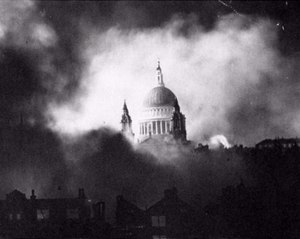The Blitz
| The Blitz | |||||||
|---|---|---|---|---|---|---|---|
| Part of the Western Front of World War II | |||||||
 The undamaged St Paul's Cathedral surrounded by smoke and bombed-out buildings and houses in December 1940 in the iconic St Paul's Survives photo |
|||||||
|
|||||||
| Belligerents | |||||||
|
|
|
||||||
| Commanders and leaders | |||||||
| Casualties and losses | |||||||
| ~40,000–43,000 civilians dead, ~46,000 injured figures for wounded possibly as high as 139,000 |
Unknown 3,363 aircrew 2,265 aircraft (Summer 1940 – May 1941) |
||||||
The Blitz, from the German word Blitzkrieg meaning 'lightning war', was the name used by the British press to describe the heavy air raids carried out over Britain in 1940 and 1941, during the Second World War.
The German air offensive was concentrated, aimed at the direct bombing of industrial targets and civilian centres which began with heavy raids on London during the latter phase of the battle for air superiority over the United Kingdom which became known as the Battle of Britain.
By September 1940—two months into the battle—faulty German intelligence suggested that the Royal Air Force (RAF) was close to defeat at the hands of the Luftwaffe. The German air fleets (Luftflotten) were ordered to attack London, thereby drawing up the last remnants of RAF Fighter Command into a battle of annihilation.Adolf Hitler and commander-in-chief of the Luftwaffe (German Air Force) Reichsmarschall Hermann Göring, sanctioned the change in emphasis on 6 September 1940.
From 7 September 1940, one year into the war, London was systematically bombed by the Luftwaffe for 56 out of the following 57 day and nights. On 15 September 1940, a large daylight attack against London was repulsed with significant German losses. Thereafter, the Luftwaffe gradually decreased daylight operations in favour of nocturnal attacks, to avoid RAF defences. The Blitz became a fundamental night bombing campaign after October 1940, when it had become clear the Luftwaffe had failed to meet preconditions for a 1940 launch of Operation Sea Lion, the provisionally planned German invasion of Britain.
Ports and industrial centres outside London were also attacked. The main Atlantic sea port of Liverpool was bombed. The North Sea port of Hull, a convenient and easily found target or secondary target for bombers unable to locate their primary targets, was subjected to raids in the Hull Blitz during the war. Other ports including Bristol, Cardiff, Portsmouth, Plymouth, Southampton and Swansea were also bombed, as were the industrial cities of Birmingham, Belfast, Coventry, Glasgow, Manchester and Sheffield. More than one million London houses were destroyed or damaged and more than 40,000 civilians were killed, almost half of them in the capital.
...
Wikipedia
